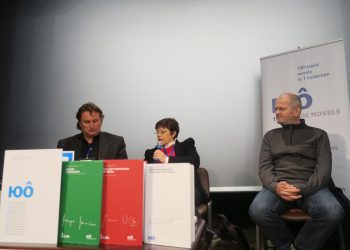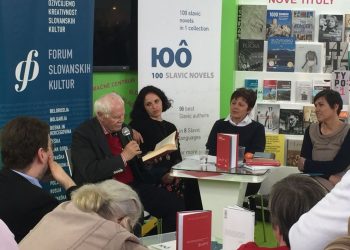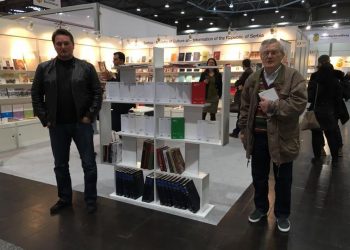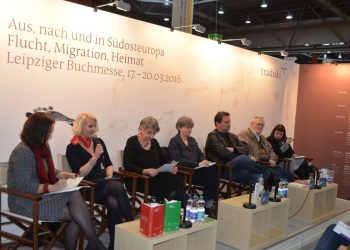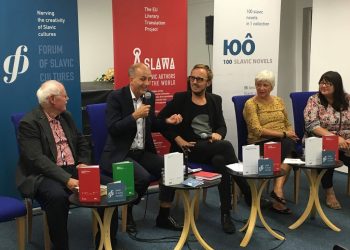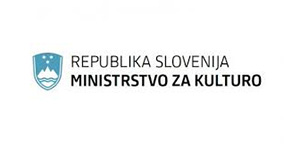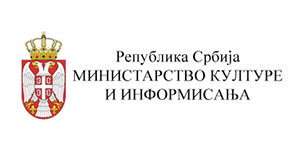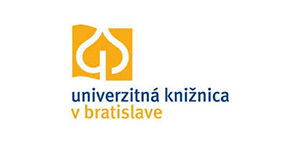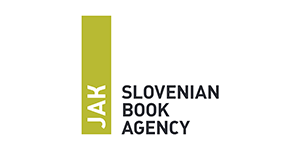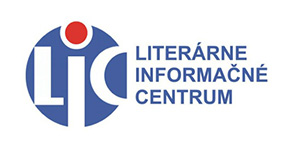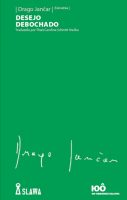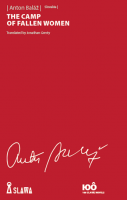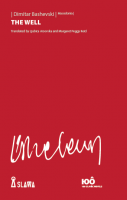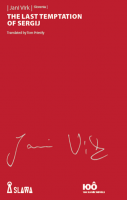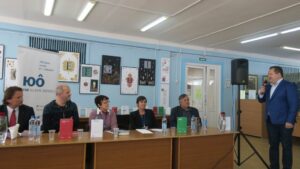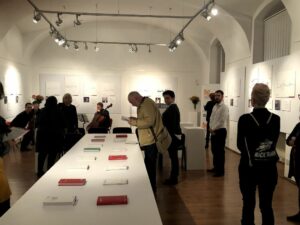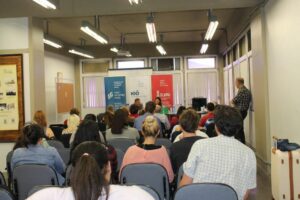Slawa
Objavljeniromani
- Drago Jančar: Drwiące żądze (port. Deseo debochado)
- Anton Baláž: Obóz upadłych kobiet (ang. The Camp of Fallen Women)
- Dimitar Baševski: Studnia (ang. The Well)
- Laslo Bašković: Klejnoty Madonny (ang. Madonna’s Jewels)
- Jani Virk: Ostatnia pokusa Sergija (ang. The Last temptation of Sergij)
„We współczesnym kanonie literatury europejskiej dziedzictwo literatury słowiańskiej jest mało znane i niedostatecznie reprezentowane, a co gorsza – bywa też całkowicie pomijane. Patrząc na regały książkowe, można odnieść wrażenie, że literatura słowiańska pozostała za murami i żelaznymi kurtynami, które kiedyś dzieliły Europę. Wspaniali europejscy autorzy zasługują na większą dostępność dla swoich czytelników, niezależnie od środowiska językowego, z którego pochodzą, siłę ich rynku literackiego lub talentu ich marketerów”
AUTORZY I TŁUMACZE
Drago Jančar
Posmehljivo poželenje
Drwiące żądze
Deseo debochado
Przełożyły: Thaís Caroline Schmitt Vrečko i Blažka Müller
Przekład na język portugalski.
“Przez tę szparę świata wszystko znikało w innych przestrzeniach pamięci: przemijające nadzieje i pragnienia, przemijające życia – jego matki, Anny, jego samego, wszystkich, wszystkich ludzi”
Mocking Desire
Gregor Gradnik, a Slovenian writer, enters the sensual and seething life of New Orleans to teach a creative writing class at a university. In a style both serious and ironic, Jančar observes and comments on the two cultures, illuminating both American and Central European forms of self-obsession. Gregor at first identifies himself as only an observer, yet seductive New Orleans soon draws him into a series of increasingly bizarre erotic, professional, and social relationships. Fracturing and realigning the cultural, psychological, and perceptual boundaries by which Gregor believes he knows the world and his place in it, Jančar reveals a deepening loss of control over our collective knowledge of the divisions between life and art, reality and dream, East and West, man and woman, naivete and cynicism, transcendence and perdition.

Drago Jančar was born in 1948 in Maribor, Slovenia. He is considered the best-known Slovenian writer, playwright, and essayist both at home and abroad and one of the most translated Slovenian authors.
He worked as a journalist, free-lance writer, movie script editor and publisher.
As a President of the Slovenian PEN Centre he was engaged in rise of democracy in Slovenia and Yugoslavia. His novels and short stories have been translated into almost 30 languages. His numerous works include several novels, plays, short stories, essays and original scripts for feature films. His accolades include the Prešeren Award for lifetime achievement (1993), the European Short Story Award of the City of Arnsberg, Germany (1994), the Kresnik Award for the best Slovenian novel of the year (1999, 2001, 2011), the Herder Award for literature (2003), the Jean-Améry-Award for essays (2007), the Premio Hemingway Award (2009), and the Premio Mediterraneo Award (2009). His novel To noč sem jo videl (That Night I Saw Her) was awardeded the Prix du Meilleur livre étranger, the award for the best foreign book translated into French in 2014.
Thaís Caroline Schmitt Vrečko is a Brazilian translator born in  Blumenau, Brazil to a family of German emigrants. She spent most of her life in Florianópolis on the Atlantic coast, where she studied English language and literature at the Faculty of Arts of Santa Catarina State University. She graduated in 2007 and devoted herself to translating. She has translated from English to Portuguese and from Slovenian to Portuguese. She is married to a Slovene and has been living in Maribor since 2008. With her enthusiasm, she soon became involved in the new environment, and with a passion for learning new languages, she added Slovene to Portuguese, English and Italian.
Blumenau, Brazil to a family of German emigrants. She spent most of her life in Florianópolis on the Atlantic coast, where she studied English language and literature at the Faculty of Arts of Santa Catarina State University. She graduated in 2007 and devoted herself to translating. She has translated from English to Portuguese and from Slovenian to Portuguese. She is married to a Slovene and has been living in Maribor since 2008. With her enthusiasm, she soon became involved in the new environment, and with a passion for learning new languages, she added Slovene to Portuguese, English and Italian.
 Blažka Müller is a lecturer for the Portuguese language at the Faculty of Arts, University of Ljubljana, teaching modern Portuguese and literature in this language. She has been a television presenter at the Television Slovenia and a moderator of various events. For many years she danced in the theater group Betontanc. She still works in theater, now as a playwright and dramaturgist. She is also a literary translator who has translated several works by Paul Coelho, Lídia Jorge, a novel Budapest by Chico Buarque and some Portuguese and Brazilian poetry. The main area of her research is Portuguese and Spanish linguistics, and at the same time the contacts of these two languages with Slovenian. As a lecturer at the Camões Institute in Lisbon, she co-designs and leads public cultural events related to Lusophony.
Blažka Müller is a lecturer for the Portuguese language at the Faculty of Arts, University of Ljubljana, teaching modern Portuguese and literature in this language. She has been a television presenter at the Television Slovenia and a moderator of various events. For many years she danced in the theater group Betontanc. She still works in theater, now as a playwright and dramaturgist. She is also a literary translator who has translated several works by Paul Coelho, Lídia Jorge, a novel Budapest by Chico Buarque and some Portuguese and Brazilian poetry. The main area of her research is Portuguese and Spanish linguistics, and at the same time the contacts of these two languages with Slovenian. As a lecturer at the Camões Institute in Lisbon, she co-designs and leads public cultural events related to Lusophony.
Anton Baláž
Tábor padlých žien
Obóz upadłych kobiet
The Camp of Fallen Women
Przełożył: Jonathan Gresty
Przekład na język angielski.
„Do wszystkich prac w obozie i poza nim upadłe kobiety mogą iść tylko w towarzystwie strażniczek. Kontakt z więźniami płci męskiej jest ograniczony do minimum i dozwolony tylko w czasie uczestnictwa w zajęciach edukacyjnych, gdy współpraca obu płci jest nieunikniona, na próbach teatralnych i podczas zbiorowej recytacji.”
The Camp of Fallen Women
The novel Tábor padlých žien / The Camp for Fallen Women (1993) was one of the first satirical portrayals of socialist practices, but its success was guaranteed by the theme itself: the re-education of Bratislava’s prostitutes after February 1948 in the spirit of socialist morality in the Nováky labour camp, which was notorious from the period of World War II, when citizens of Jewish origin were collected there. In 1997 the novel was filmed by the director Laco Halama and in 1998 it was presented at the Berlinale film festival.

Anton Baláž was born in 1943 in Lehota pod Vtáčnikom. He studied journalism and pursued a career as an editor, he also worked in the Office of the President of the Slovak Republic. Anton Baláž is one of the foremost Slovak novelists but also writes film and TV scripts and radio plays.
His most important novels are: Shadows of the Past (1978), You Must Live Here (1983), A Surgical Decameron (1989), The Camp of Fallen Women (1993), Penelope’s Return (1998), The Country of Forgetting (2000), Gods of the Four Seasons (2003).
He was awarded the Prize of the Union of Slovak Writers for the novel You Must Live Here, Premium of the Slovak Literary fund for the novels Dream of the Cellars, Shadows of the Past and Greenhouse Venus and Prizes from domestic and foreign festivals of radio plays.

Jonathan Gresty (b. Peterborough, United Kingdom, 1965) holds degrees in English Literature (B.A., Durham University), Creative Writing (M.A. Manchester Metropolitan University) and Translation Studies (PhD., University of Prešov). He teaches courses in academic writing and translation studies at the Philosophical Faculty of the University of Prešov and also works as a translator and proofreader. He has published dozens of literary and non-literary translations from Slovak into English, and is particularly interested in working with contemporary writers. His hobbies include music (classical and popular) and running.
Vodnjak (2001)
V središču pripovedi je vodnjak kot prispodoba globokega in skritega, metafora kopanja v lastno dušo, da bi našli majhen izvir, v katerem lahko človek – kot v zrcalu – uzre lastne zmage (in zmage drugih), pa tudi stvari, ki jih morda ne bi hotel videti – poraze, moralne zdrse, napake v odnosu do sebe in do drugih, nečimrnost. Glavni junak, ki ga domnevno vodijo plemeniti cilji, si zada nalogo, da bo izkopal vodnjak za ljudi v odročni vasi, vendar se izkaže, da se za dobrimi nameni skrivata tudi nečimrnost in želja po nadvladi. Avtor razkriva duhovne in moralne posledice njegovih dejanj. Preteklost in sedanjost se prepletata in povezujeta različne usode.
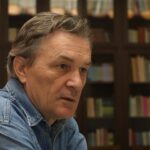
Dimitar Baševski je romanopisec in pesnik. Rodil se je leta 1943 v vasi Gjavato blizu Bitole. Diplomiral je na Filozofski fakulteti Univerze sv. Cirila in Metoda v Skopju. Delal je kot novinar in urednik, dopisnik iz tujine in pozneje kot založnik. Bil je predsednik severnomakedonskega PEN centra 2000–2006 in je od takrat njegov častni predsednik.
Baševski je avtor naslednjih romanov: Tujec, Vrnitev, Ni smrti, dokler zvoni, Leto v življenju Ivana Plevneša, Sarajanovski nagelj, Anjin dnevnik (za otroke), Vodnjak, Brat; in pesniških zbirk: Hiša življenja, Začasno bivanje, Premagan čas, Temeljni kamen.
Njegove knjige so bile prevedene v angleščino, češčino, romunščino, grščino, srbščino, turščino in albanščino. Prejel je naslednje nagrade: nagrade 11. oktober, nagrade Racin, nagrade Pečalbarska povelba, nagrade Vančo Nikoleski in nagrade roman leta za roman Vodnjak, ki je bil leta 2002nominiran tudi za mednarodno nagrado Balkanika.

Ljubica Arsovska is a translator with more than 30 years of professional experience. Since 1996 she is a director and editor-in-chief of Kulturen Život quarterly and freelance translator and interpreter since 2007. She has translated numerous novels, poems, plays and essays from Macedonian into English, published at home and abroad, almost always with either Peggy Reid or Patricia Marsh Stefanovska.

Margaret Peggy Reid worked as an English language lector at the Ss Cyril and Methodius University in Skopje since 1969. Among others she proofread a number of literary works – plays, poetry and novels. She was awarded the Struga Poetry Evenings Award for Translation into a Foreign Language. In 1994 she received the Macedonian Literary Translators’ Society Award; she also won the first prize at the Stratford-upon-Avon Poetry Festival, UK, twice for her own poetry and Queen Elizabeth II Certificate for services to Macedonian literature and culture.
Laslo Blašković
Madonin nakit
Klejnoty Madonny
Madonna’s Jewels
Przełożył: Randall A. Major
Przekład na język angielski
„Widząc, jak po dwóch godzinach wyczerpującego muzykowania nadal grają i śpiewają odprężeni, ba nawet uśmiechają się do siebie w odpowiedzi na zabawne gesty, rozmawiają wspólnym językiem, uzupełniając się nawzajem i promienieją cichym, ledwo zauważalnym szczęściem, zdałem sobie sprawę ze swojej okropnej, nieznośnej samotności. Rozejrzałem się po innych, siedzących ze mną przy jednym stole, którzy najwyraźniej doświadczali tego samego bólu. «Potrzebuję towarzystwa innych pisarzy tylko po to, żeby mieć z kim się napić» — pomyślałem i poparłem tę myśl gorzkim uśmiechem”
Madonna’s Jewels
Blašković creates four voices that blend into a veritable quartet singing about turn-of-the-millennium agony as they try to reconcile the iconographies of the past with those of the present. Set in a prison infirmary during the NATO bombing of Serbia, The Madonna’s Jewels is a post-modern compendium of political incorrectness. At times contemplative and wise, at times raucous, at times humorous, all four narrators, each justly imprisoned but for the wrong reasons, inspire the reader to reflect on the meaning of form in an increasingly formless world.
That world, presented here with all its constrictions and conflicts, individual and general, inner and outer, enables us not only to see and understand, but also to feel the depth of despair caused by the disintegrating processes at work in the former Yugoslavia. Creating an identity is never an easy task, especially when one’s lost identity was promising and suited many. That is probably why Blašković’s characters cannot escape their self-made prisons, nor do they want to.

Laslo Blašković was born in Novi Sad in 1966. He graduated in Yugoslav literature and has worked as an editor, cultural researcher, and cultural manager in Vojvodina and Belgrade. He has published many poetry collections, novels, essays, and short story collections. All his works, particularly the novel The Madonna’s Jewels have been translated into many foreign languages, including Hungarian, Bulgarian, Slovakian, Slovenian, Ukrainian, Polish, German, French and English.
His most important works are: The Lives of Dice Rollers, Morning Distance, Poets’ Wives, Wedding March, Still Life with a Clock, The Madonna’s Jewels, Adam’s Apple, Hunchback Tournament, Story of Exhaustion, and Death Mask: Picaresque Novel.
He has won many prestigious awards: the award of the Serbian Academy of Science and Art from the Branko Ćopić Foundation for the best Serbian novel (2005), the Stevan Sremac Award for the best book of stories/novel (2007) and the literary scholarship of the “Borislav Pekić” Foundation for the project of the novel Madonin nakit/The Madonna’s Jewels (2001).

Randall A. Major [MJ1] (b. San Antonio, Texas, 1959) holds degrees in Classical Languages and Religion (B.A., Baylor University), Theology (B.D., Baptist Theological Seminary, Rueschlikon, Switzerland) and Applied Linguistics (M.A., University of Novi Sad). He teaches courses in translation studies at the University of Novi Sad at the Faculty of Humanities. He is also one of the editors and translators of the Serbian Prose in Translation series, produced by Geopoetika Publishing. He has published dozens of literary translations from Serbian into English. His hobbies include music (folk, blues, rock) and amateur photography.
Jani Virk
Zadnja Sergijeva skušnjava
Ostatnia pokusa Sergija
The Last Temptation of Sergij
Przełożył: Tom Micheal Sidney Priestly
Przekład na język angielski.
“Odkąd wrócił do Słowenii, czuł się mniej więcej nieustannie tak, jak gdyby był zawieszony w paraliżującym i lepkim uczuciu, niezdolny do prawdziwego dotknięcia rzeczy.”
The Last Temptation of Sergij
The Last Temptation of Sergij (Zadnja Sergijeva skušnjava) is a novel of transition about the period after Slovenia gained its independence in 1991.
The main protagonist of the novel, young journalist Jošt Rowenski, wants to write a biography of Sergij Tramar, a middle aged intellectual, one of the main characters of Slovenian opposition in 70s and 80s and one of the group that created spiritual and intellectual atmosphere that enabled social changes which meant break with the former country and one-party system. Against all expectations the story of a heroic protagonist becomes a story of pathetic crash of ideals.
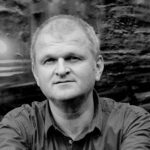
Jani Virk (Slovenia) was born in 1962 in Ljubljana. He studied the German language and comparative literature and graduated in 1987. By 2014, he had completed a doctoral dissertation on the middle age in contemporary literature and film.
He wrote seven novels, four books of short stories, a volume of poems, a book of essays and a novel for youth. He also translates literature (Maister Eckhart, G. Roth, E. Canetti, H. C. Artman, T. Bernhard, J. W. Goethe, H. Böll are among authors he has translated).
He was awarded several prizes at home and abroad, among others the Prešeren Foundation Award. One of his short stories, The Village Teacher, was filmed at the beginning of 90s. Virk’s novels are translated and published in Austria, Germany, Mexico, Serbia, Poland and Croatia; his works were also published in magazines in many other countries,

Tom Priestly was born in Uganda in 1937, raised in England, and has lived in Canada since 1966. He studied at Cambridge (MA, 1965) and Simon Fraser University, BC (PhD, 1972). He is Professor Emeritus of Russian Language and Slavic Linguistics at the University of Alberta. His special research interest is Slovenian sociolinguistics; he has worked in Sele, a Slovenian-minority village in Austria, since 1978. He has published over 90 research articles. He has been translating Slovenian literature since 1989, most notably the poetry of France Balantič, Maja Haderlap, Kajetan Kovič, Cvetka Lipuš and (with Henry R. Cooper) of France Prešeren.
W CENTRUM UWAGI
Pierwszy przekład powieści
SLAWA w Azji
Targi Książki w Londynie
POCZĄTKI
Pod patronatem Forum Kultur Słowiańskich ukazuje się seria książkowa 100 powieści słowiańskich – międzynarodowy projektem tłumaczeniowy, którego celem jest promocja współczesnych powieści słowiańskich powstałych po upadku Muru Berlińskiego. W 2015 i 2016 roku seria została uzupełniona o projekt SLAWA. Celem projektu, wspieranego przez Unię Europejską w ramach programu Kreatywna Europa, jest promocja pisarzy słowiańskich nie tylko w krajach słowiańskich, ale także za granicą, poprzez wydanie pięciu wybranych prac w przekładach na język angielski i portugalski. W projekcie wzięli udział nie tylko znani autorzy, ale także doświadczeni tłumacze najwyższego szczebla.
Tłumaczenia wybranych powieści przeznaczone były dla jak najszerszego kręgu czytelników pragnących poznać bliżej współczesną literaturę słowiańską. W ramach promocji projektu przeprowadzono zakrojoną na szeroką skalę kampanię, obejmującą prezentacje książek na trzech kontynentach, a także na wielu prestiżowych targach książki m.in. w Lipsku, Belgradzie, Londynie i Pradze.


